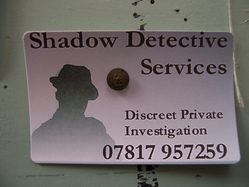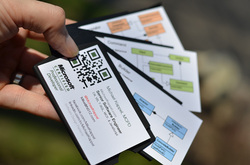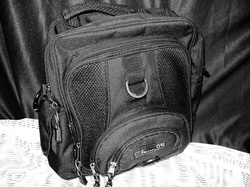|
,Let's face it. Not all Private Investigators are the best organized when it comes to "paperwork" (we are referring to both digital case file information and real paper). So what do you do???? Here's some advice, not necessarily new advice mind you, from one of the most disorganized private investigators we know. (She asked that we withhold her name - so we named her "Messy").
Private I HQ: "How do you stay organized since we're told you're disorganized?" Investigator "Messy": "For paperwork I use pocket file folders. One for each case I'm actively working. I simply take all paperwork, like my receipts, copies of evidence, all of it, and put them in the folder. Now it's all in one place. I throw a couple of blank sheets of paper in there for my notes, expense and time logs." Private I HQ: "OK, Investigator "Messy", what do you do about electronic files?" Investigator "Messy": "The same thing. I make a file on my computer desktop with the case number as the name. When I receive an email in reference to a case I save it to a PDF file and then drag and drop in the case file folder on my desktop. Digital files, like surveillance video, or statements, I do the same thing. By the way, a neat thing you can do, I guess depending on your computer, you can right click and print and everything in the folder, except the videos of course. I can then add those to my pocket file folders when I'm on the road." Private I HQ: "That sounds pretty organized. Why do you feel you are disorganized?" Investigator "Messy": "My friends remember how it was for me before I set-up this system. My desk was always piled high with papers. I mean really piled up. You couldn't see the top of my desk." [She places her hand about a foot above the table showing the height:-)] "I felt like I could find everything, and I could. It just took me a long time. Now I simply grab the case file folder, or open it on my desktop and look for what I need. The key is to put anything in the folders as soon as possible. Immediately! I know other investigators that do the exact same thing. So, it's not my idea, just an idea that I put in to motion because of the ribbing I took from friends and family." Private I HQ: "Why not an electronic case file system?" Investigator "Messy": "Cost and it's just me. Also, I tailor my completed reports for what the client needs. Sometimes that's hard to do with an electronic file system. And, for me, having an electronic report writing system requires me to be tied to a desk. I'm on the go a lot and often work away from the office. I'm sure there's an online solution out there, but again, it's a cost issue. A cost that would ultimately have to pass on to my clients." Sometimes, the tried-and-true, simple method is the best.
0 Comments
Brief video for PI Firm business owners on the basics of business branding. This video is provided in partnership with Propiacademy.com Whether you like it or not, your client list needs to continue to grow for your business to grow. Invest time to grow your client list with these helpful hints:.
1. Call backs - remember that client from a few months ago? Give them a call and see how they are doing. Encourage them to refer you to their friends. 2. Join a local business association - Networking is a good way to get your business out there in front of those that may need your services. Look for meetings of attorneys, business owners, and others in your area and make a point to visit with them. Carry plenty of business cards with you.  If you have been in business for a little while, you have chosen a logo and/or color scheme to suit your tastes. Branding your private investigations business increases your customer base through brand recognition. If you are happy with your brand, the following will make your branding efforts work for your business: 1. Consistency - Brochures, emails, business cards, web site, even office appearance and other media that represent your business should all be similar in appearance. Customers, and potential customers, will immediately recognize your brand. They will remember your business when a friend is in need of your product or service. Use the company catch phrase, logo, and color scheme on all of your materials. 2. Continually engage customers - Customers can come and then go -- go away. Identify opportunities to create an ongoing dialogue with customers.
4. Don’t forget the power of “freebies” - Carve a few dollars from your budget to include your logo, catch phrase, web address, and office phone number on some “freebie” items. Refrigerator magnets, paper coffee cups/sleeves, pens, or pencils, or other inexpensive give-away items. The freebies you share with your customers are seen by their friends. Individuals that you may not have reached otherwise, stretching your marketing dollars. Everyone likes a small freebie every now and then! Your business is your investment. Spend a little time to consistently show your brand, include your employees, in expanding your market. There are all kind of theories about how the economy can impact private investigators. Some say that when the economy goes down their business picks up while others say they see a drop in business when the economy drops.
Take a minute to tell us how the economy has impacted your business. A brief presentation of considerations when you are creating your own website.  Private investigators are often contacted early in a divorce process to provide services. Providing some sound advice for them to follow as they prepare for divorce will empower them and reduce some of the stress they will experience as a part of the process. If they have explored all of the options to save their relationship and find that divorce is the only option share the following tips with them before they begin the process: 1. Create a list of property and financial assets. List cars, boats, household goods and any other assets you own. Photograph the items to show their present condition. Where possible, include the purchase dates value at the time of purchase and a brief description of how the property is used and by whom. Most important, identify where the assets are located. 2. Gather health insurance coverage information for you and your children. Obtain copies of health insurance plans. Attorneys will need to negotiate health insurance coverage as a part of the divorce. It will be easier to gather health insurance information prior to beginning a divorce. If there are long term prescriptions or health needs, make a list and include a copy of the last two or three months of bills. 3. Get a post office box and start re-directing your financial mail and legal documents. Getting a post office box will allow you to redirect your credit card statements, receive important legal documents from your attorney, and provide security that mail will not be intercepted. 4. Start putting money aside. Start saving money to help with legal, moving and unexpected expenses while your divorce is being negotiated. During a divorce it is possible that some of your joint assets will be frozen or held until a final agreement is reached. 5. Open saving and checking accounts. Once the divorce proceedings are started you may not be able to access funds in joint accounts. It is important that you have a checking and savings account started to help you with the transition and to start building your credit. Let your attorney know about the accounts. 6. Open credit card accounts. Open credit card accounts in your name only before the divorce. This will help you establish your credit, receive better interest rates if you are not working. You may also need the credit to help with expenses during the initial divorce proceedings as joint accounts may not be accessible. Important: depending on your state you will be responsible for any charges made on the new accounts. 7. Get a copy of your credit report. Look for lines of credit, or credit cards that you were not aware of. If found, share this information with your attorney and/or private investigator. Also, prior to the divorce proceedings you will want to dispute any inaccuracies that may appear in your credit report, clear up any errors. Keep a copy for later use. 8. Change your will, beneficiaries on insurance policies. Remove your spouse from any living wills or wills you may have. It will be easier to make these changes prior to the divorce. It may become more complicated to make changes after the divorce. When changing beneficiaries on insurance policies, be aware that your spouse may be contacted. Talk with your insurance provider to understand the complete process. 9. If you suspect your spouse is having an affair. Don’t confront your spouse or the person you believe they are having an affair with. Gather information such as receipts, names of witnesses but don’t confront them. Share this information with your attorney and/or private investigator. Confronting a cheating spouse prior to the divorce provides them the opportunity to hide or terminate the relationship. Confronting the other individual could land you in legal trouble. 10. Get professional help—legal and financial help are invaluable, particularly when dividing property. It is important that you have legal representation. Negotiating on your own or trying to navigate the legal requirements requires experienced professionals. Let your attorney deal with the legal issues and take some of your worries away. Consult with an attorney as soon as possible. No matter the circumstances, the divorce process is difficult and challenging for the individuals involved. Providing them with some useful tips to prepare will keep them in control of their situation. And, if they change their mind and continue the relationship, none of the above tips would put them in an irreversible position.  Many small business owners find keeping up with the company accounting is a tedious process. I have spoken with several small business owners that have the same complaints:
Ok, that last statement has a little bit of frustration behind it. When you narrow the field to smaller Private Investigative firms the responses become more emotional....sometimes angry. One investigator said, "I'm an investigator. That is what I am good at. Keeping the books is always a challenge that I seem to have less time and desire to complete." The last part of the statement, "...desire..." is probably the most accurate. If you find that balancing the books is a tedious, mind-numbing task that you would rather not do, remember this is how you get paid. Try these simple techniques to reduce the stress in keeping your income and expenses properly recorded. 1. Set time aside every week to devote to your accounting. - Set a calendar reminder for each Monday to devote one hour to updating your books, paying bills and sending invoices. Make it a habit! Include additional time every two weeks to make those calls to collect on overdue accounts. Setting a schedule will allow you to "eat the elephant one small bite at a time" and reduce your stress or dread to once a week for a short time period out of your day. 2. Keep it simple. - If you are just starting out keep a simple ledger just like your personal checkbook that records incoming and outgoing with a running balance. In the beginning you don't need multiple accounts or need a complex accounting schedule. 3. Don't be afraid to call your Overdue clients. Create a script to use when you call. Be friendly and offer a simple reminder to your clients. If you are dealing with a large company, often you will need to find the right person that handles accounts to get paid in a timely manner. Be patient, professional and kind. 4. Explore accounting software. - There are several free accounting software programs available to small businesses. Many interface with your credit cards, bank accounts and offer invoicing to save you time and keep your tax prep personnel happy:-). 5. Re-check your balances. - Goes without saying but unfortunately it often goes without being done! Check your work just like you would proofread an investigative report you are about to send to a client. Finding errors weeks or months later can be tedious and costly. Not to mention that errors in invoicing can be embarrassing and may cost you repeat business. If you keep up with your business accounting and continue to grow your business you will be able to hire someone to do it for you!  As a private investigator it is important to have business cards. How else will people know how to contact you or find your web page? Our friends at Quick & Dirty Tips have just the podcast for you if you are trying to decide what should be on your business card. Listen to the podcast below or visit the site for the transcript.  Every Private Investigator should have a jump bag in their vehicle. Taking the time to set-up a small, inexpensive bag with essential items and placing one in your car, office and home is a great preparation idea that is inexpensive and will help you in emergency situations. Use any bag that can hold essential items you might need in an emergency situation. You never know when a case might take a different direction. So what do you include in your bag?
Having a small bag in your car with these essential items will prepare you for any loss of essential equipment, a sudden schedule change during surveillance or if you have to make a quick overnight trip unexpectedly. |
PI HQPI HQ is dedicated to bringing you important information that impacts the private investigations world. Archives
July 2019
Categories
All
|
|
Information of interest to professional private investigators.
|
Site created and maintained by Holmes-Tech LLC
 RSS Feed
RSS Feed